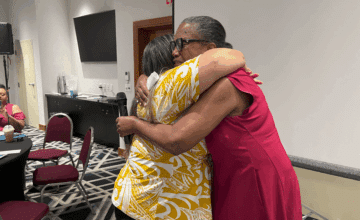How can early childhood professionals support the families they work with in handling these public moments of parenting “disaster” with grace and an eye to strengthening the parent-child relationship?
We’ve all seen the flood of articles, memes, and videos online that paint a judgmental picture of parents trying their best with crying babies, ornery toddlers, and prickly preschoolers. According to Tuning In, ZERO TO THREE’s National Parent Survey, 90% of moms and 85% of dads feel judged when it comes to their parenting skills. In other words, just 2 out of 20 moms and 3 out of 20 dads aren’t bothered by the disapproving frowns or raised eyebrows of their partners, other parents, and complete strangers in the supermarket—a very small number, for sure. The Tuning In data show that all this judgment is shaping the experience of modern-day parenting. So the question is: How can early childhood professionals support the families they work with in handling these public moments of parenting “disaster” with grace and an eye to strengthening the parent-child relationship?
Imagine this very common scenario: A parent is in the grocery store on the busiest shopping day of the week. She is trying to hustle her 3-year-old out of the candy aisle. But it’s too late. Suddenly, there’s an extra-large bag of chocolates clutched in his adorable little hand. The next thing she knows, he’s lying on the floor, kicking and screaming, and there are chocolates everywhere. She is mortified… and everyone in the adjacent check-out line is watching. How can she keep her cool? Here are some ideas to keep in mind the next time you are talking about public meltdowns with parents. You can also check out our new resource on managing tantrums for additional guidance for families.
Tantrums are a part of toddler life.
Toddlers are discovering that they’re separate people from their parents. (Yay, that’s what’s supposed to happen at this age!) They want one thing. Parents want something else. But toddlers don’t have all the words they need to communicate their thoughts and feelings, and they’re never the people in charge (even if it doesn’t feel that way to parents). Typical development can be a recipe for frustration, and tantrums, and tears—for toddlers and sometimes for parents, too.
A child’s behavior is trying to tell parents something.
Wondering with parents about the meaning of a behavior—or to see a child’s behavior as a pattern (“the baby seems to get fussy when we go to places like the mall with bright lights, music, and lots of people”)—helps parents consider responses that are helpful and nurturing. For many parents, the idea that a challenging behavior is actually a powerful communication may be a new idea that needs time to take root. Sometimes discovering the meaning behind a child’s behavior also takes time and detective work (observation, trial-and-error). It can be stressful and frustrating for parents as they continue to explore possibilities, while responding to behavior as consistently and compassionately as possible. This is where the support of early childhood professionals is critical: To support the process of wondering, to guide parents’ thinking about limit-setting, and to validate that sometimes the answer isn’t clear. Sometimes, truly, the best thing parents can do is simply be present with their child during difficult moments.
Remind parents that they are the “grown-ups.”
When someone young is angry and telling the world how mean you are, it is difficult not to respond the same way. Adults who work with families have all been frustrated and angered by young children at times, despite their professional training. Parents have the added challenge of being in an active stage of learning how to set limits and be a disciplinarian, at the same time when they need these skills the most. Help parents understand that validating a child’s feelings (“You really don’t want the shot because you feel worried about the pinch you’ll feel.”) doesn’t mean giving in to the child. When parents can help their children make sense of their feelings, children may actually calm faster from a tantrum. (See our resource for more guidance.) By receiving anticipatory guidance and support, parents might also develop the perspective that tantrums are typical for toddlers, and that this moment will pass. Learning to feel confident about handling challenging behavior, and more comfortable in the role of limit-setter, is an important part of a parent’s development at this stage as well.
Tomorrow is another day.
There are so many opportunities to deal with challenging toddler behavior! You can encourage parents to try a different response next time, or pre-plan together to anticipate common tantrum-triggers and how to get around them, such as: A trip to the grocery at a time when the parent is feeling less stressed, a big detour around the candy aisle, or a book bag to keep active toddlers occupied.
Your presence is critical.
Many parents did not have positive experiences with discipline as children themselves. They often want to respond to challenging behavior in effective, appropriate ways, but aren’t sure what that is. Through shared learning, reflection, and planning—and with your support—parents can chart their own path to limit-setting that is both nurturing and effective.





